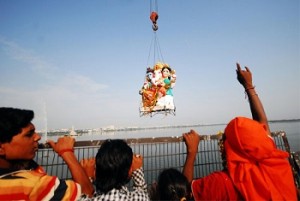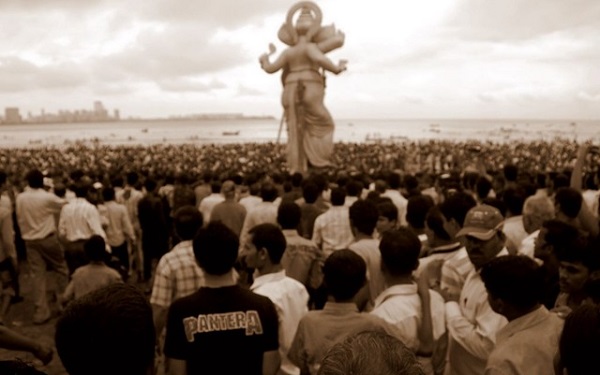Do you know what Ganeshotsav really means? Or what the immersion ritual means? When were you going to find out?
 by Jatin Sharma
by Jatin Sharma
The day when Mumbai turns into a fanatic for its favourite God is here. Ganeshotsav kicks off today.
The 10-day Ganeshotsav is Mumbai’s biggest festival, or as I like to call it, Mumbai’s biggest event where the whole city is immersed in the celebrations. From pandals on every corner of the street to houses in different societies setting up Ganesha statues, Ganeshotsav is one big celebration that can’t be missed. To put it succinctly, Mumbai waits for this festival to come all year long, and turns into a very different creature during this festival.
But with each passing year, there is one question that crosses my mind: Are we still only about the festivals that we celebrate?
I am afraid to answer this question because I don’t find any celebrations nowadays that only pertain to God. I see commercialisation, politicisation and vandalisation associated with every festival. I see people who, rather than playing Ganesha songs and propagating His teachings, play songs about Sheilas and Munnis.
The younger generations have always asked their elders – Why do we celebrate so many festivals? The answer to that is, we were a farmer society and a society that believed in values, and that our festivals were the right way to instill those cultural values in us. But with every passing year, whether it is Ganeshotsav, Holi, Navratri or any other festival, it has become more about our convenience rather than our culture. We want to celebrate, but on our terms.
For example, during Ganeshotsav, it is believed that Ganesha visits Earth and stays with us for 10 days. In those 10 days, we are supposed to make him feel welcome. Do our Bollywood item songs make for good welcome songs? Again, the immersion is a symbolic send-off to the God, where it is believed that He takes our misfortunes with Him. How many of us even know about this? Instead of seeing Him off with respect and sombre devotion, we send Him on his way with songs blaring out of loudspeakers. And that’s not all, because we  don’t know the prayers and the mantras we need to chant when we worship Him or see Him off, we play recorded CDs that do the job for us. Even when someone else chants the prayers for us, we still don’t bother to find out what the words mean or learn them.
don’t know the prayers and the mantras we need to chant when we worship Him or see Him off, we play recorded CDs that do the job for us. Even when someone else chants the prayers for us, we still don’t bother to find out what the words mean or learn them.
I am not going all Right-wing here and demanding that you must believe in God. I just feel that you should do things only because you believe in doing them, not because you want to show off or prove a point to someone.
Not many know what the word ‘Ganapati’ means. ‘Gana’ means ‘community’ and ‘pati’ means ‘the head’. The legends of Ganesha always talk about being prosperous in the real sense of the word, and spreading happiness no matter what. But all these years, I have been seeing that the festival has just turned into an event where people get drunk and are least interested in maintaining the sanctity of the elephant God. They play loudspeakers that blast out music and hurt birds and animals, that ruin any chances that students may have of studying in a quiet environment. Then there are the pandals themselves, which take up half the road and harm people’s commutes. Why can’t a celebration be complete nowadays without disrupting normal life and societal norms?
Let’s celebrate the festival the way it is supposed to be celebrated – with love and respect for human beings and the environment, with the involvement of the community and while focussing on what’s most important, Lord Ganesha. Since He is also known as the God of Wisdom, my only prayer for him this year is that he showers us with wisdom, since we’ve all forgotten what His festival is all about.
Jatin Sharma is a media professional who does not want to grow up, because if he grows up, he will be like everybody else.
(Pictures courtesy full2faltu.wordpress.com, postnoon.com)





